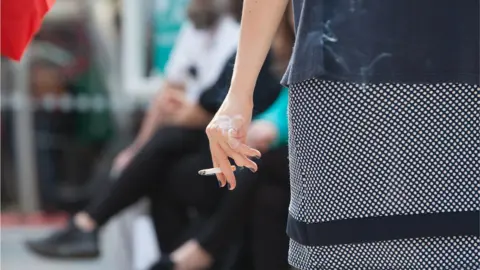LGB people 'more likely to have mental health issues'
 Getty Images
Getty ImagesLesbian, gay and bisexual people are more than twice as likely as heterosexuals to have a long-term mental health condition, an analysis of NHS data suggests.
They are also more likely to drink heavily and smoke, the report says.
About 2% of people said they were lesbian, gay or bisexual in the 2011-18 Health Survey for England.
The findings "confirm well-established health inequalities for LGB people", say rights groups.
Of the adults surveyed over the eight years, 1,132 or 2%, identified as lesbian, gay or bisexual. Participants weren't asked about trans status or gender identity, but this is being considered for future surveys.
About 16% of LGB respondents reported having a long-term mental or behavioural disorder, compared with 6% of heterosexual adults.
LGB people also reported lower average mental well-being scores than heterosexual people, with LGB women having the lowest score of all groups.
They were also more likely to drink more than the recommended units of alcohol.
One-third of LGB adults drank more than 14 units of alcohol a week, an amount which "put them at increased or higher risk of alcohol-related harm", compared with a quarter of heterosexual people.
The proportion of people who drank no alcohol was similar among white people of different sexualities, but among ethnic minority communities, LGB people were more likely than heterosexuals to drink.
LGB people were also significantly more likely to smoke. This includes one in three LGB women, compared with one in six heterosexual women.
But they were less likely to be overweight. Nearly two-thirds of heterosexual adults reported being either overweight or obese, compared with half of the LGB population.
"This data confirms well-established health inequalities for LGB people, such as much higher rates of mental ill-health, as well as highlighting less well-known health inequalities impacting our communities," said Eloise Stonborough, associate director of policy and research at campaign group Stonewall.
"Understanding the specific health disparities for lesbian, gay and bi people is a crucial step in being able to address them and ensure that the NHS is providing a healthcare service which supports us all. To continue capturing this data, it's important that all health services monitor and report on health outcomes for all lesbian, gay, bi and trans people."
The analysis was conducted by the National Centre for Social Research (NatCen) for NHS Digital, based on a representative sample of over-16s who took part in the Health Survey for England between 2011 and 2018.
The data adds to existing research indicating some health outcomes are worse for LGBT people.
An LGBT Foundation report found one in six LGBT people said they drank alcohol almost every day over the past year in 2017, compared with one in 10 across the wider population.
Just over half reported experiencing depression, compared with an estimated 20% of the wider population.
